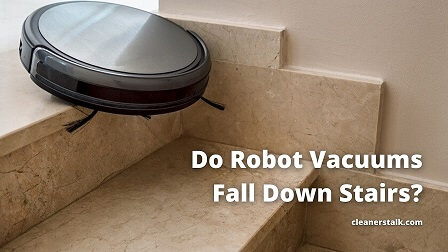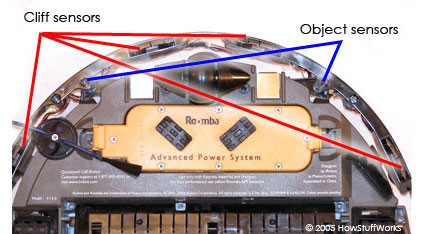
Do Robot Vacuums Fall Down Stairs? (Surprising Answer)
Cleaners Talk is reader-supported. This post contains affiliate links, we may earn a commission at no additional costs to you. As an Amazon Associate we earn from qualifying purchases.
Robot vacuums are getting smarter. While it is obvious that robot vacuums cannot climb stairs, they have become more advanced, yet cheaper over the years. So much so, many people are buying one for each floor of their house. This begs the question, do robot vacuums work on stairs, or do they fall down stairs?
Do robot vacuums fall down stairs? Most robot vacuums are equipped with “cliff sensors” designed to prevent them from falling down stairs. In fact, the sensors have become more advanced over the years, so robot vacuums almost never fall down stairs. Outdated models, however, may fall down stairs.
With that said, there are plenty of considerations if you’re looking to buy a robot vacuum, especially if your house has stairs. In this post, we will look to answer the question: will Roomba fall down stairs? By the end of this post, you should have a clear idea of what a robot vacuum can or cannot do.
Do Robot Vacuums Fall Down Stairs?
Because the cliff sensors in robot vacuums (also known as Roombas) have improved, they almost never fall down stairs anymore.
What makes a robot vacuum so innovative is the self-navigation system. The biggest difference between a $100 model and a $1,000 model is the precision of the navigation sensors. Take the iRobot Roomba vacuum for example. The AWARE Robotic Intelligence System can make decisions for itself.
At the same time robot vacuum prices have come down, their functionality has gone up. Nowadays, robot vacuums are equipped with multiple sensors that collect useful environmental data. Not only do most robot vacuums have mapping technology, but they have multiple sensors to help them navigate expertly.
One of these sensors is the cliff sensor, designed to measure the distance between the robot and the floor. Cliff sensors are infrared sensors mounted underneath a robot vacuum. It is pointed downward so the robot vacuum can detect stairs or steep drops, as a tumble may cause serious damage to the robot.
1. How do the cliff sensors work?

Cliff sensors work by constantly emitting infrared light. This light bounces back to the device immediately. If it does not receive a response, it knows a cliff is approaching. The robot vacuum will then stop and change direction. The sensors are placed at the edges of the device to help prevent it from going over the edge.
2. Do all Roombas have cliff sensors?
Nowadays, it is rare to see a robot vacuum without cliff sensors. In fact, the Roomba 500, 600, 700, 800, 900, e Series, and i Series are all equipped with cliff sensors that prevent them from falling down stairs. You can have peace of mind knowing that most robot vacuums are equipped with cliff sensors.
Can Robot Vacuums Clean Stairs?
So, can robot vacuums clean stairs? Without the ability to climb or cascade down a flight of stairs, robot vacuums are not effective for cleaning stairs. While robot vacuums have cliff sensors that prevent them from falling down stairs, they are most useful for cleaning flat surfaces, not stairs.
As of right now, there are no robot vacuums that can climb stairs. Even with 15 years of research and development, the most well-known robot vacuum manufacturer, iRobot, has no models that can climb and clean stairs. However, this may soon change as companies look to invent smarter robots.
In fact, a two-legged robot capable of climbing and cleaning stairs has been developed by Alphabet, a subsidiary of Google's parent company. It is equipped with two large legs for improved balance. Who knows, we may get our hands on a smart robot vacuum that cleans stairs in the near future.
Built by Japanese robotics firm Schaft, the robot was shown carrying weights, stepping over obstacles, and cleaning a set of stairs through vacuum attachments on its feet. The robot's ability to perform household chores could mean that it is being developed as a domestic assistant of the future.
How do you stop a Roomba from falling down stairs?
The best way to stop a Roomba from falling down stairs is to clean the Roomba's cliff sensors regularly. A Roomba’s cliff sensors are the only thing that can recognize stairs and ledges, so if it is dirty, it may have trouble recognizing stair edges. The cliff sensors also have difficulty on black or dark carpets.
To clean the cliff sensors, start by turning your robot vacuum upside down. Wipe each cliff sensor opening with a clean, dry cloth. Make it a habit to clean the sensors on your robot vacuum regularly, especially the cliff sensors, to prevent your robot vacuum from falling down stairs and edges.
Alternatively, you can use virtual walls to prevent a Roomba from falling down stairs. The virtual wall keeps a Roomba in the areas you want cleaned and out of the areas you don’t. It works by creating an invisible barrier that the Roomba will not cross. Once placed near a staircase, the Roomba will not cross it.
The combination of cliff sensors and virtual walls should be enough to prevent your robot vacuums from falling down stairs.
Robot Vacuum Considerations
Experts suggest robot vacuums may not perform as well as traditional vacuum cleaners, especially for deep-cleaning sessions. A robot vacuum can only pick up approximately 20 percent less sand than a traditional vacuum cleaner. Therefore, a robot vacuum is only good for limited purposes.
So what are they good for? Robot vacuums are perfect for doing little jobs every day. Think of them as automatic maintenance to keep your house clean. Most robot vacuums are Wi-Fi and smartphone-connected, so you can tell them to vacuum while you are away at work or before you come home from vacation.
Bottom Line
And there you have it, a simple post to answer: do robot vacuums fall down stairs? Now you can have peace of mind knowing that robot vacuums are smart enough to recognize stairs and will not fall down stairs. However, if you are expecting robots that can clean stairs, you need to wait for it to be developed. 🙂
You may also want to read our comparison reviews:
